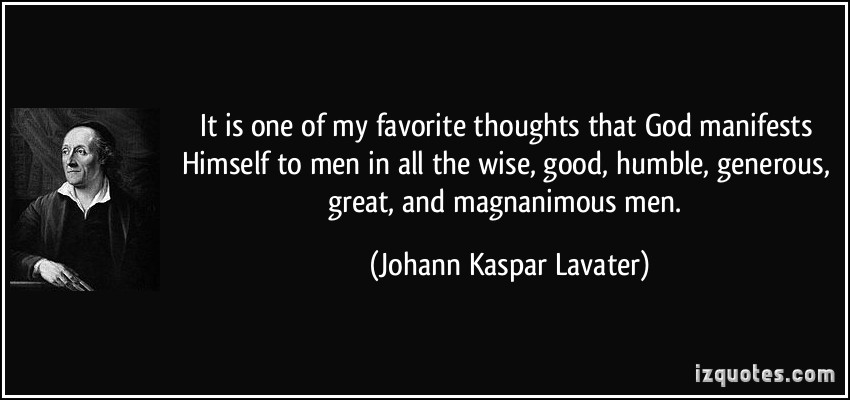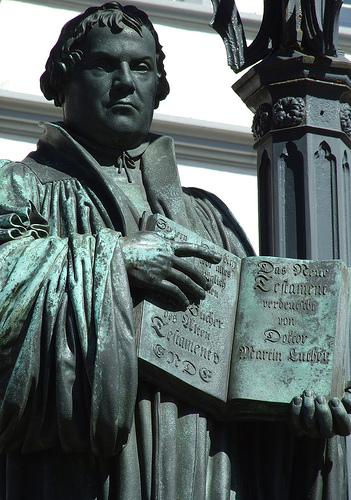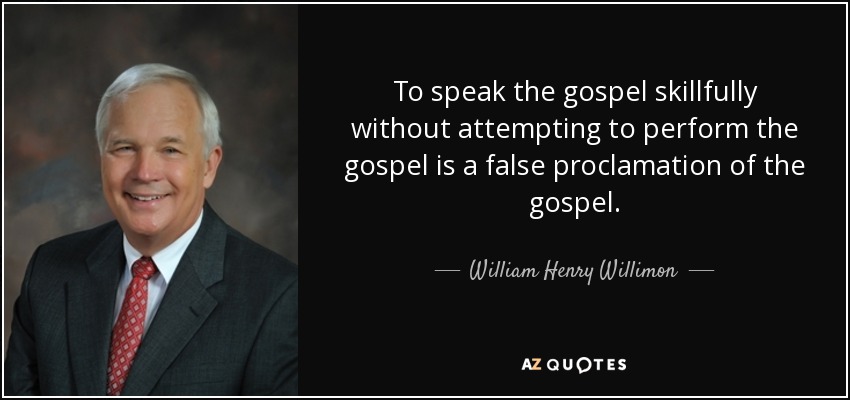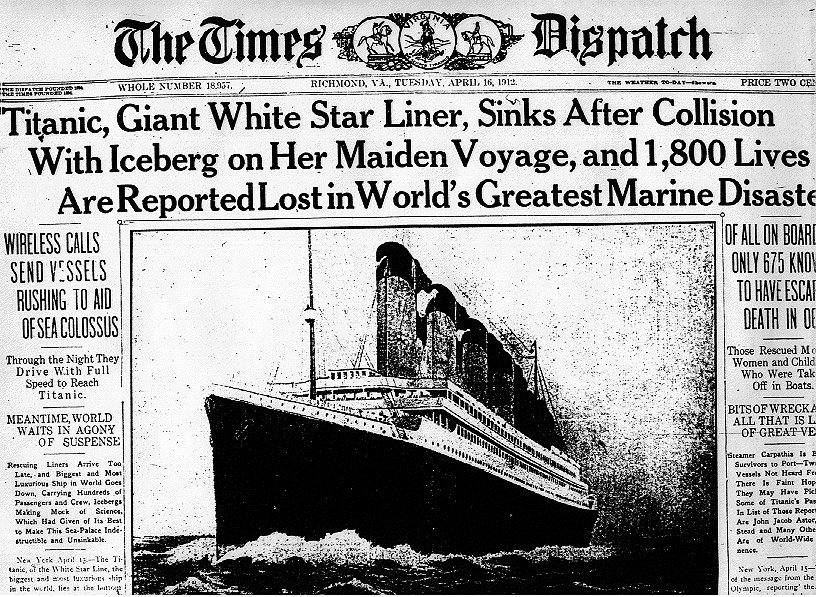Johanson, Kurt I. (ed.)
The Word in this World: Two Sermons by Karl Barth
trans. Christopher Asprey (Vancouver: Regent College Publishing, 2007).
66pp. ISBN: 1-57383-411-4
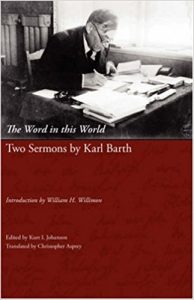 This little booklet contains two Barth sermons from different periods of his life, a foreword by Eberhard Busch, an introduction by William Willimon, an afterword by Clifford Anderson and acknowledgements by the editor which tell the story of how the booklet came into existence. Altogether it is an attractive and interesting little package. Johanson declares his hand on page 24: “It is also a clarion call to the pastors who herald the glorious gospel of our God from the pulpit, and to those who hear it in the pew, to powerfully proclaim and witness to the Word in this world.” But not only pastors:
This little booklet contains two Barth sermons from different periods of his life, a foreword by Eberhard Busch, an introduction by William Willimon, an afterword by Clifford Anderson and acknowledgements by the editor which tell the story of how the booklet came into existence. Altogether it is an attractive and interesting little package. Johanson declares his hand on page 24: “It is also a clarion call to the pastors who herald the glorious gospel of our God from the pulpit, and to those who hear it in the pew, to powerfully proclaim and witness to the Word in this world.” But not only pastors:
I want nothing more than the church, and her scholar-preachers, to be able to offer, in one unified voice, as a part of her calling, a confident word to the world. It is my simple hope and prayer that the Pastor and the Professor can work together toward the recovery of courageous and powerful biblical preaching (28).
Thus the book is concerned with Barth as homiletician rather than theologian, although in truth, the two cannot be separated: “The main value of Karl Barth for us contemporary preachers is that he is a theologian,” says Willimon (10), for “thin descriptions of God are killing our sermons” (18). Thus, Barth’s insistence on the priority of the biblical text, on giving “close, obedient attentiveness” to God by means of this text is what preaching is about. Further, this attentiveness concerns itself, says Eberhard Busch, not simply with what God said once-and-for-all, but with what God says. “Barth learned from the Reformers that the sermon in the service of worship is to correspond to the prophetic office of Jesus Christ” (7-8).
So what do we find in Barth’s sermons? The first, from April 1912 when Barth was just twenty-five years old and a newly-minted pastor, is a pastoral response to the sinking of the Titanic which had occurred earlier that week. The second, from November 1934, was preached in Bremen’s Frauenkirche in the darkening days of the Nazi regime. The first is the work of the young “Red” pastor of Safenwil, the second, that of the seasoned professor of Bonn (although he was stood down from his position shortly afterwards) and a leader in the Confessing Church.
In Barth’s Titanic sermon we see the young liberal pastor at work. His text is not Scripture but a world event. For this Barth, God speaks to and addresses us through these events, though we must make the meaning from them. Barth assumes that we can read the will and purpose of God in and through the events of the world. The “divine spirit in humanity” is equated with human progress, creativity and inventiveness. God wills this progress, this mastery over nature (36). We see also the young socialist pastor at work as he blames the disaster on capitalism. Barth even notes that the president of the shipping company “is among those who have been rescued—unfortunately, we are almost tempted to say” (40)!
The argument of the sermon develops in three points. First, Barth addresses the hubris of humanity which draws divine judgement from God. Second, he insists that this hubris is grounded in self-interest and leads to destruction. Finally, the way of Christ, or of mercy, is seen in the self-sacrifice of some ordinary sailors that others might live. This spirit must prevail.
So this shipping disaster doesn’t merely point up our helplessness and our faults, our broken arrogance and our secret egoism. Nor does this [mercy] just proclaim to us our transience and its cause. It declares to us with a clarity we rarely experience that God’s purposes are advancing in the world. One senses something of how Christ is becoming an ever greater force in the world, when one reads of those who did not seek to save themselves but did their duty, who ultimately did all they could, not for themselves but for others, who silently and nobly retreated in the face of death to allow those who were weaker than them to continue on the path of life. In view of facts such as these, it takes great unbelief to keep referring to our age as evil and godless (41-42).
As a communicative exercise, it is possible to appreciate Barth’s style and rhetoric. He draws on a contemporary event that has captivated the daily press and is no doubt prominent in the thought and discussion of his parishioners. The reader can sense the energy and pastoral concern with which the sermon might have been delivered. As a sermon, however, some commentators have given Barth a great Fail. Barth himself lamented, in later life, about this sermon delivered in his “misspent youth.” Why the concern? A number of reasons might be given, but primarily, Barth later came to expect the biblical text to be the master of the sermon, something obviously not the case in this sermon, focussed as it is on a contemporary event. The sermon is more social comment than biblical exposition. More problematic, Barth does not preach Christ at all in this sermon, but uses the name of Christ—only once in the sermon—as a cypher, or as a symbol for an ideal of human and social progress. Just two years later Barth’s liberal optimism came crashing down with the onset of the war which forced a radical re-evaluation of his theology, on the basis, not least, of his discovery of the “new world in the Bible.”
The second sermon is entirely different and reflects this discovery. According to Hughes Oliphant Old, Karl Barth’s Bremen sermon was “one of the outstanding sermons of the twentieth century” (25). The sermon is clearly addressed to the congregation living “in these days and times” of great temptation and struggle, urging them to courageous obedience to the lordship of Jesus. In this sermon the biblical text is front and centre, and the sermon begins without fanfare, introduction, or contextual remarks. Barth’s method is simply to exposit the biblical text itself (Matthew 14: Jesus—and Peter—walking on the water), line-by-line. Yet the exposition is not “historical” but applied as though the text speaks directly as “our story.”
The way to counteract paganism in the form of National Socialism is by close, obedient attentiveness to another God. The very form and structure of the sermon is itself a kind of theological claim (Willimon, 21).
Barth provides a theological and ecclesial interpretation of the text. In Barth’s hands, Peter images the Confessing Church, boldly stepping out in obedience to Jesus, but fearful and faltering—and also helped! It is hard to imagine a more forthright summons to the church assailed by Hitler’s regime, yet this is precisely how Barth is applying the biblical text. Just as Peter by his action was distinguished from the other disciples,
There is distinction like this in the church; people who are distinguished by what is demanded of them, distinguished by the dangers to which they expose themselves, but also distinguished by the help that comes their way. And distinction like this, a specific event like this, has always been the mystery of the great periods of the Christian church. Is it the case that distinction like this is to be granted to us too in these days and years, to us, to our evangelical church, in that from the midst of everything that bears the name of church, a crowd has dared to step out in obedience and become the confessing church? (56)
No longer the young, liberal, we see here Barth as an ecclesial theologian of the Word, doing theology for the sake of proclamation, that the church might truly be the church, bound only to one lord, and thus truly free. Discernment in the time of decision is often unclear and even fraught. But the church must risk obedience and act. We do wait; we must hasten! And Christ is with us.
And if you say to me, “Indeed, but isn’t there always still room for error; couldn’t the voice of our own hearts always try to pass itself off as the voice of Jesus Christ?” then my reply is, “We may and must continually seek the word, the conclusive word of Jesus Christ himself, in the word to which the prophets and apostles are witnesses, the word of those who for every age have born testimony to him, to his revelation, to his work, to the love of God which has appeared in him.” And whoever hears this testimony to him knows that he himself is there, that the light is there, the truth is there, the victory is there; not a human victory but God’s victory in his church, even in such times of tribulation and division as we are now living through. We can be sure that the victory is always on the side of the Holy Scripture, and so it is today (53).
 The new issue of Crucible has just been published online and is available here.
The new issue of Crucible has just been published online and is available here.